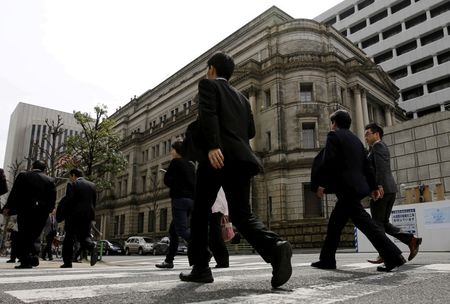By Leika Kihara and Stanley White
TOKYO (Reuters) - Japan's government is likely to inject 6 trillion yen ($57 billion) in direct fiscal outlays into the economy over the next few years under a planned stimulus package, double the amount initially planned, the Nikkei newspaper reported on Tuesday.
The Finance Ministry had initially earmarked 3 trillion yen for direct spending from national and local governments under its draft fiscal stimulus plan. But the amount was doubled on requests for bigger spending by government officials and ruling party lawmakers, the Nikkei said without citing sources.
Finance Minister Taro Aso told reporters the government is still debating the size of stimulus spending but hopes to make a decision soon. A draft plan obtained by Reuters on Tuesday shows spending will focus heavily on infrastructure.
Prime Minister Shinzo Abe, emboldened by a large election victory earlier this month, is gambling on infrastructure spending to revive growth amid disappointment that his reforms have not done enough to improve the economy.
"The prime minister's instructions are to focus on investment for the future," Aso said at a press conference.
"We need a bold and comprehensive package, but it will take a little more time to finalize it."
The size of spending could increase further as the government presents the draft stimulus plan for negotiations with ruling party lawmakers from Tuesday, the Nikkei report said.
The total size of the package, which could be announced as soon as Aug. 2, could exceed 20 trillion yen, the Nikkei said.
To fund part of the package, the government will compile a supplementary budget for the current fiscal year of around 2 trillion yen, the paper said. The rest will be funded in the budget for the next fiscal year beginning in April 2017, it said.
DIRECT, INDIRECT SUPPORT
The draft spending plan obtained by Reuters showed details of the stimulus package, which expands loan guarantees and lowers lending rates on funding schemes for small- and medium-sized companies.
The Japan Bank for International Cooperation will use lending schemes to support small companies operating overseas amid concerns that Britain's exit from the European Union could hurt access to credit.
The government will use public-private investment to bring forward the construction of a maglev line by up to eight years and expand the conventional bullet train network.
The package will also invest in hotels and improving public transportation to welcome more tourists, including the increase in visitors expected for the 2020 Tokyo Olympics.
The government plans to increase infrastructure spending to boost agriculture exports and to shore up infrastructure in Japan's many natural disaster-prone areas.
The stimulus package will raise pay for workers at day care centers and elderly homes, two industries that are struggling to attract workers to meet surging demand.

The draft also shows the government plans to tighten enforcement of labor laws to narrow the pay gap between regular and part-time employees doing the same work.